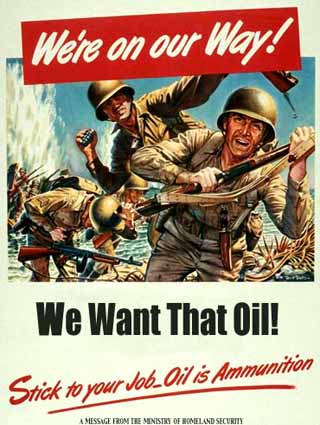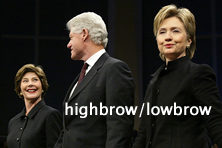Tiny Tim Tiptoes Through the Truth
On Bill Moyers' PBS special report "Buying the War" last week, NBC Washington Bureau Chief Tim Russert was among many "journalists" placed under Moyers' microscope of skepticism when it came to their reporting just after September 11, 2001, and leading up to the Iraq war. Russert displayed a casually devastating deludedness concerning his role as enabler in the matter, especially in light of Moyers' tight revealing of Russert's failure to truly research dubious claims by Bush administration officials on his show, "Meet the Press." Even when it came to objective issues regarding weapons of mass destruction, or the non-existent Al Qaeda/Saddam connection, Russert was all too ready to accept the answers of his guests, especially Vice President Cheney, as cold fact.
BILL MOYERS: Was it just a coincidence in your mind that Cheney came on your show and others went on the other Sunday shows, the very morning that [a New York Times story reporting Saddam Hussein had weapons of mass destruction] appeared? TIM RUSSERT: I don't know. The New York Times is a better judge of that than I am. BILL MOYERS: No one tipped you that it was going to happen? TIM RUSSERT: No, no. I mean- BILL MOYERS: The-- the Cheney-- office didn't make any-- didn't leak to you that there's gonna be a big story? TIM RUSSERT: No. No. I mean, I don't-- I don't have the-- this is, you know, on Meet the Press, people come on and there are no ground rules. We can ask any question we want. I did not know about the aluminum-tube story until I read it in the New York Times. BILL MOYERS: Critics point to September eight, 2002 and to your show in particular, as the classic case of how the press and the government became inseparable. Someone in the administration plants a dramatic story in the New York Times. And then the Vice President comes on your show and points to the New York Times. It's a circular, self-confirming leak.TIM RUSSERT: I don't know how Judith Miller and Michael Gordon reported that story, who their sources were. It was a front-page story of the New York Times. When Secretary Rice and Vice President Cheney and others came up that Sunday morning on all the Sunday shows, they did exactly that. What my concern was, is that there were concerns expressed by other government officials. And to this day, I wish my phone had rung, or I had access to them.As "Buying the War" proves, any reporter had access to them. Throughout the piece, Moyers' questions are concise and enable substantive answers from the interviewee. His follow-up questions actually take into account the response from the subject being interviewed, something Tim Russert has a horribly difficult time doing. This has always been one of my greatest problems with Meet the Press--Russert's MO is to play quote or word "gotcha," otherwise he simply plays stenographer, allowing the guests to bloviate punctuated with "whys." Later in the Moyers' special, Russert tossed out a populist line in an attempt to align himself as an ordinary guy with no motive but the truth when it comes to the political discussions that occur on Meet the Press. Russert said, "I-- look, I'm a blue-collar guy from Buffalo. I know who my sources are. I work 'em very hard."That is, if he has access to them.Unlike John Edwards, who explicitly acknowledges his life situation has drastically changed since his days as a mill-worker's son, Russert does not use his roots to illuminate his ability to sustain a unique perspective on the impact of public policy. Rather, Russert seeks to exploit his distant roots in order to deflect attention from his current reality: old Timmy is a big elite tree now, and his blue-collar days are over. What concerns viewing Americans now is not how Tim can use his beginnings to relate to the masses, but whether Tim can use his present status (and alleged intellect) to force the truth from so-called political leaders, in service to the masses that employ the leaders. Clearly Russert cannot.It seems that Tim Russert does work his sources hard, but only for facts that will help him create questions that focus purely on semantics, the greatest foundation for political theatre. Such superficial "gotcha" work was on full display this Sunday when an impressive and surprisingly clear Senator Joe Biden appeared on Meet the Press. The following exchange blew me away, in that it supports the notion that Russert carries a singular focus into each show, and sadly it is not the truth. It is Tim's outline for the show (i.e., his gotcha-agenda) built around the guest's past appearances on Meet the Press, or past quotes made elsewhere. In no way is his focus to aggressively finesse the actual positions of his guests.MR. RUSSERT: Senator Reid, the leader of the Democrats in the Senate, Senator Feingold, the senator from Wisconsin, have joined together and introduced a bill, and here’s the operative language: “No funds appropriated or otherwise made available under any provision of law may be obligated or expended to continue the deployment in Iraq after March” 31st, “2008.” Do you support that?SEN. BIDEN: No.MR. RUSSERT: Why?SEN. BIDEN: For the reasons I just stated. I think it’s—may—we may end—look, Tim, here’s where we may end up. This president may so—make it so difficult to reach the objective, the only reasonable one I think’s available, which is to leave Iraq, leaving behind a country secure within its own borders, not a threat to its neighbors, that is a loosely federated republic. It may get so bad that we do not have that option, and all of the option we have available to us is to withdraw and try to contain the civil war inside Iraq. We are not there yet. And until we reach that point, I am not prepared to say there are no circumstances under which, after a date certain, we would not have a single troop inside of Iraq.MR. RUSSERT: So you will not vote to cut off funding for the war, period.SEN. BIDEN: No, that’s not what I said. I just got finished telling you what I said, which was if, in fact, this president changes the circumstances again, where there lose all prospect of being able to achieve the goal that I’ve just set out, which I think could be achieved if we decentralize power in Iraq, if we have a limited federal government in Iraq, where we train the army, where they have control of the borders and their currency, where we give control over the fabric of the daily lives of the various warring factions—including their local police forces—their laws relating to marriage, divorce, the things they’re killing each other over, if we get to the point where that is no longer an option and the place has totally disintegrated—which it may—that’s a different circumstance. You can’t—I don’t know anyone who can say—I speak for myself. I cannot say for—with absolute certainty what I will do on every potential contingency because I have no control over this president’s foreign policy and the direction he’s taking us in Iraq.MR. RUSSERT: But as of today, you would not vote to cut off...It is not difficult to see what kind of brush Russert is painting with when it comes to the troop-hating Democrats.The larger point is that members of the elite media do not report or reveal anymore, they only relay. Keeping their reputations and power-connections intact have become more vital than shedding light on the political successes and failures of those who are elected to produce results. What the Moyers' report exhibits is a Washington press corps willing to accept whatever they are told from the Bush Administration as gospel, and to doubt anyone else as shrouded with ulterior motives.Nothing is set to change when it comes to the 2008 presidential contest, where the horserace and image race are all in vogue, but discussing policy is not. With all of the threads of our society weighed thin with the strain of Bush's war and cronies and failures, we're in serious trouble if the some portion of the press cannot step up and behave like adults.But don't look to me-- I'm just a blue-collar guy from Buffalo.The entire Bill Moyers' PBS Special, "Buying the War," can be viewed here.















